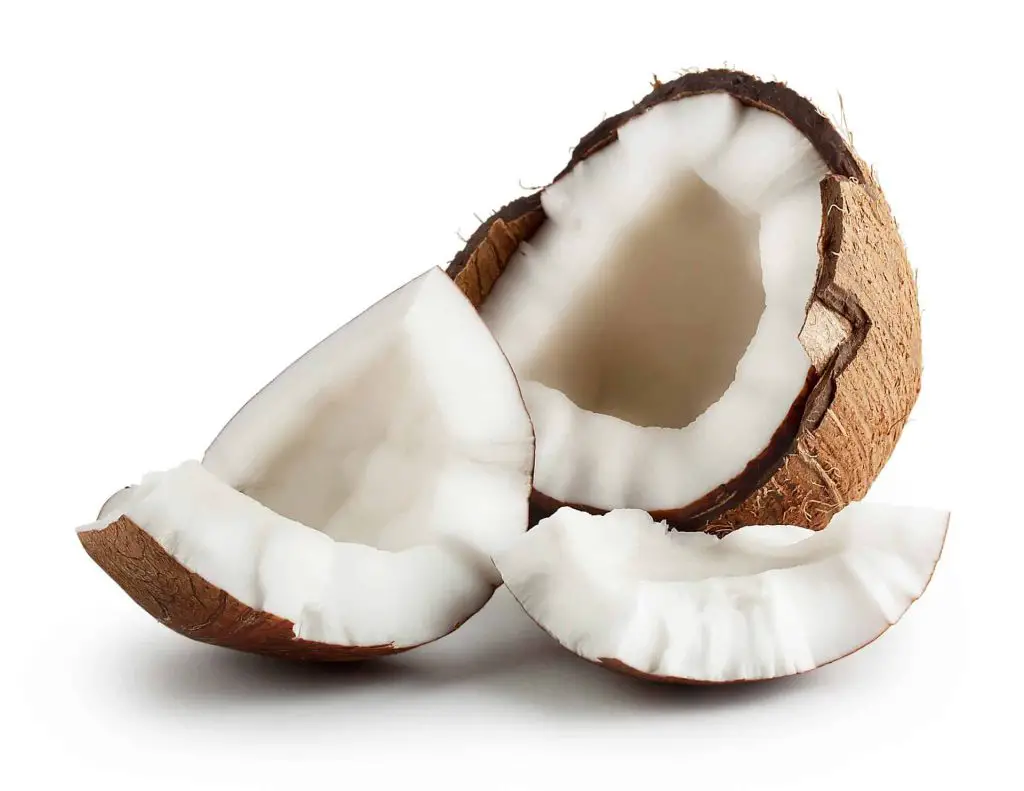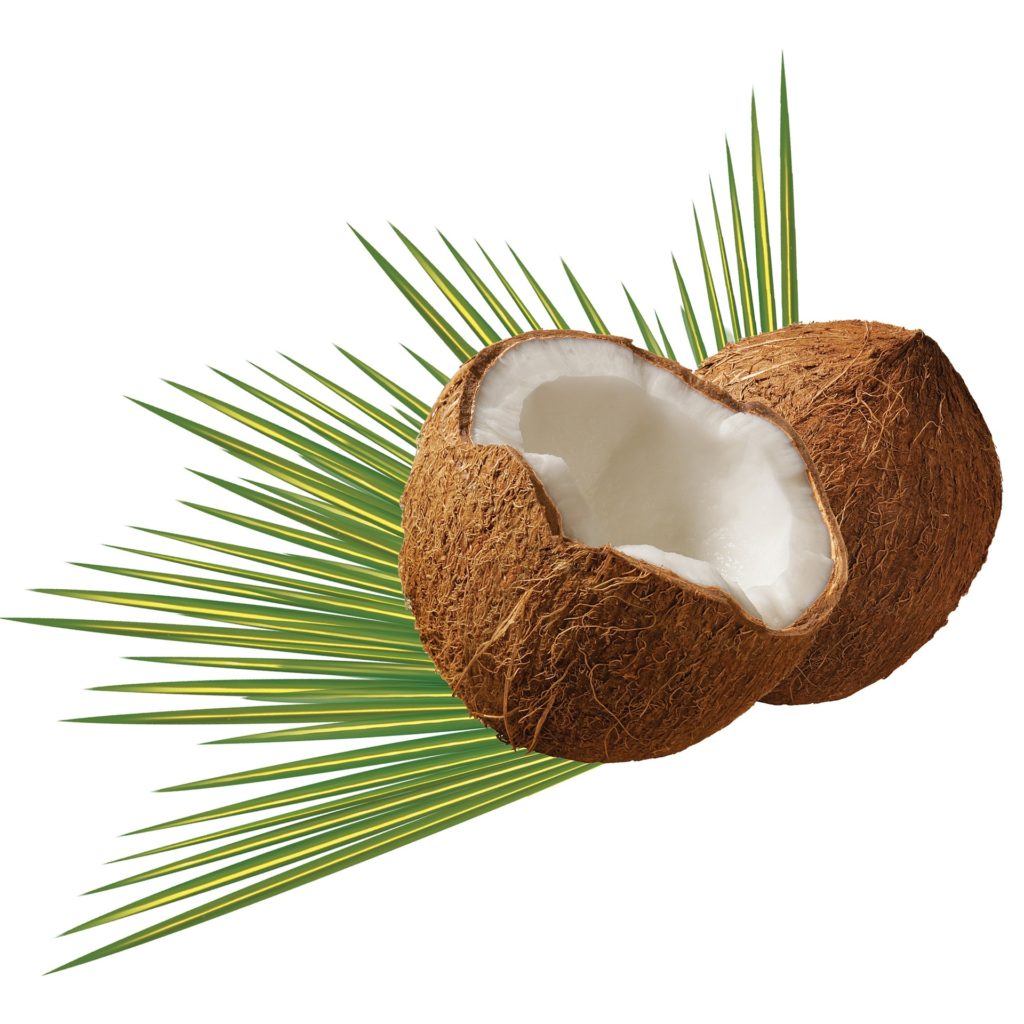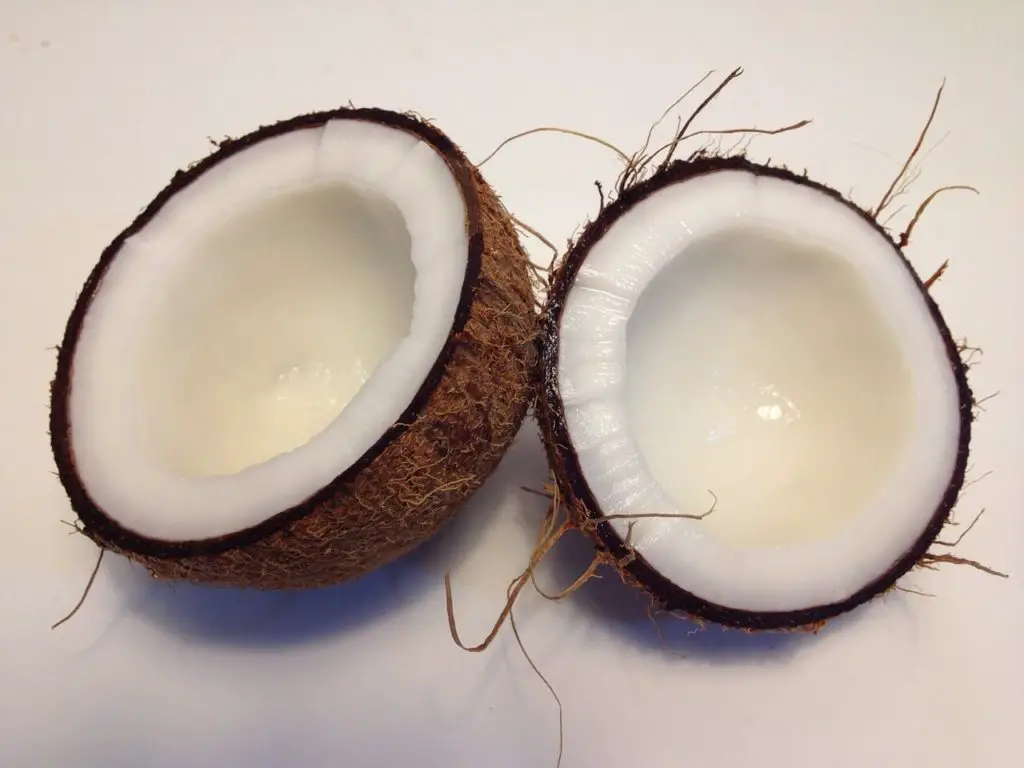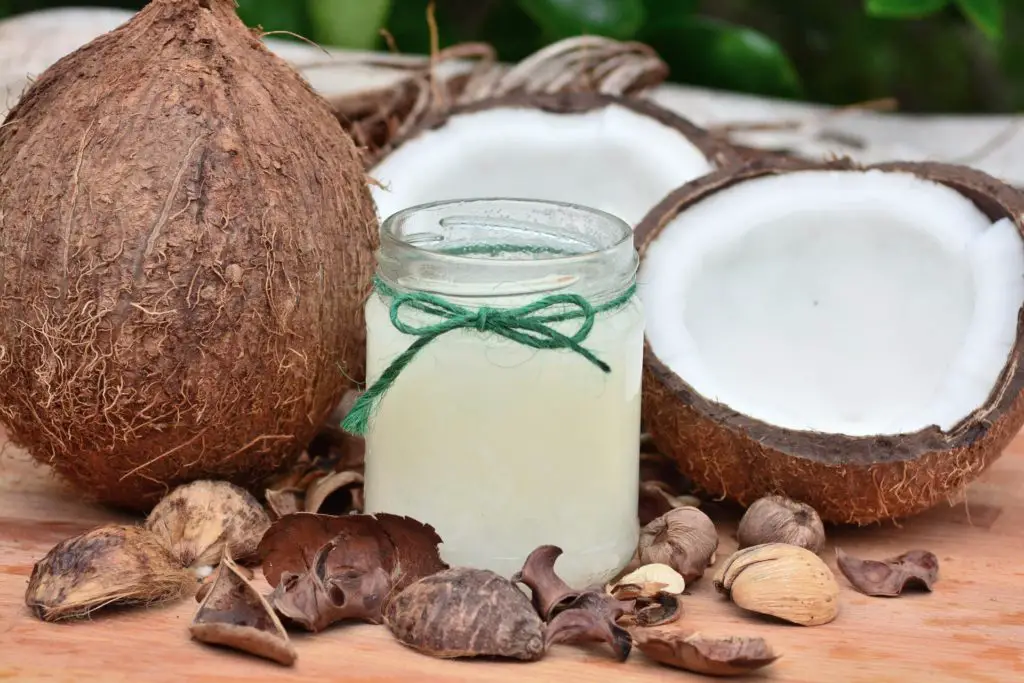Coconuts, the delicious fruit of a coconut palm. You might have purchased dog shampoo or dog treats that contain coconut oil. It’s not uncommon for dog owners to give their dogs coconut oil, but can dogs eat coconut meat?
Coconut meat is the white flesh inside the coconut shell. Yes, it is safe for dogs to eat. It is a non-toxic healthy fat with unique health benefits. Coconut can be mistaken for a nut; however, they are actually a palm fruit in the drupe family. There are many layers to a coconut, people and canines can eat the meat found inside the coconut shell and husk.
Can dogs eat coconut water? Yes. The water found in the center of the coconut is safe for dogs to consume. The parts of the coconut that are NOT edible for dogs are the shell, husk, and skin of the coconut.
In this article, Can Dogs Eat Coconut?, you will learn the many health benefits of eating coconut meat, how to prepare a fresh coconut and what precautions should be taken when giving this food to your dog.
- Nutritional Value of Coconut Meat for Canines
- How to Prepare a Fresh Coconut
- Best Way to Serve Coconut
- How Much Can My Dog Eat?
- Potential Concerns for Serving Coconut to Dogs
- Alternatives to Coconut Meat
Fed in appropriate amounts, coconut meat makes a healthy snack for canines.
Related Articles:
- How to Cook Liver for Dogs
- How to Get a Picky Dog to Eat
- How to Stop Your Dog from Peeing When Excited
- How to Keep Your House from Smelling like Dog
- How to Measure a Dog for a Harness

Can Dogs Eat Coconut? Nutritional Value of Coconut Meat for Canines
Fresh coconut is naturally low in sugar, high in fiber and contains beneficial antioxidants. Coconuts are most known as a healthy source of lauric acid.
- High in Lauric Acid (As Energy) – Dogs can absorb the molecules and use them as a source of energy.
- Major anti-inflammatory properties that reduce overall swelling in joints and hot spots
- Boosts immunity.
- High in antioxidants that support a healthy immune system.
- Anti-viral properties with extra defense against viruses and parasites.
- Beneficial for skin and coat. The fatty acids in coconut contribute to a shiny healthy coat.
- Soothes inflammation and promotes healing.
- Contains vitamins and minerals such as magnesium, iron, zinc, and calcium.
- High in manganese which supports healthy bone health and metabolic functioning.
- Fibrous supporting healthy digestion.
- Healthy form of electrolytes (especially in the coconut water)
Lauric Acid. The most unique nutritional benefit of coconut meat is the lauric acid. Lauric acid is a medium chain fatty acid that digests rapidly and is source of mental energy for the dog. As a dog ages they need more healthy brain energy for learning, memory and decision making.
Medium chain fatty acids have also been known to reduce seizure frequency in dogs.
Additional benefits of consuming lauric acid include fighting off viruses, treating yeast infections, ringworms, and giardia. Another unique benefit of lauric acid is it specifically benefits the dog’s coat because it easily penetrates the dog’s hair shaft.
The meat of coconut is a highly nutritious and beneficial food to include in your dog’s diet.
Related Articles:
- Ultimate Guide: How To Take Care Of A Puppy
- Ultimate Guide: How To Take Care Of A Dog
- Ultimate Guide: How To Take Care Of A Senior Dog
- The Benefits of Owning a Dog
- Top 12 Tips for First Time Dog Owners
Can Dogs Eat Coconut? How to Prepare a Fresh Coconut
Can dogs eat coconut? Yes, but with any new food, introduce it to your dog slowly. If you are uncertain if your dog can eat coconut, always consult with your local veterinarian.
- When choosing a fresh coconut, gently shake to listen for liquid inside the shell. Check the outside of the coconut for mold.
- Remove the hairy fibers of the coconut before cutting open.
- You will need a large bowl and cleaver. Open coconut by using the backside of a cleaver. While holding the coconut over the bowl, tap the coconut with the backside of the cleaver. Tap the center of the coconut as you turn it at the same time.
- If you do not have a cleaver: use a hammer and towel. Wrap the coconut in a towel and use a hammer while turning the coconut
- Drain the coconut water. Filter the water and save for yourself and your dog.
- Bake coconut for 15-20 minutes for 400°. Remove and cool. Use a flat screwdriver to wedge between the shell and meat.
- Once the shell falls off, use a potato or vegetable peeler to remove the skin. Cut or grate the coconut meat into small strips.
- Store uneaten coconut meat in the refrigerator.
Related Articles:
- A Review of the Top 5 Best Brooms For Dog Hair
- A Review of the 5 Best Peanut Butters for Dogs
- A Review of the 4 Best Dog Shampoos for Itchy Skin
- A Review of the 5 Best Dog Brushes For Short Hair
- A Review of the 6 Best Dog Harnesses for Hiking
Can Dogs Eat Coconut? Best Way to Serve Coconut to Dogs
Dogs usually love the naturally sweet and unique taste of coconut. You can serve coconut to your dog raw (fresh), dried or pressed into an oil (coconut oil).
Fresh Coconut. The best way to utilize all the nutrients in coconut is to serve it raw. Heat will destroy the vitamins and trace minerals. Grate the coconut and serve the appropriate portion to your dog. One cup of fresh grated coconut contains 5 grams of sugar.
Dried Coconut. Many supermarkets sell dried coconut. It is shredded coconut that has been heat dried. Dried coconut lasts longer on the shelf. One cup of dried coconut contains 8 grams of sugar.
Avoid sweetened coconut, as it contains refined sugars that are unsuitable for dogs. Dogs can have both fresh and unsweetened dried coconut.
Coconut can be sprinkled as a food topper. It can also be mixed with banana, pumpkin or peanut butter and served stuffed in a toy designed for dogs.
Related Articles:
- The Best Canned Dog Food for Dogs with Sensitive Stomachs
- A Review Of The Top 5 Best Tactical Dog Harnesses
- How to Build an Outdoor Dog Potty Area on Concrete
- A Review of the 5 Best Dog Muzzles
- A Review Of The Top 5 Best Dog Clickers
Can Dogs Eat Coconut? How Much Can My Dog Eat?
Grate or shred the coconut into the size that your dog will enjoy. Ensure that the coconut is small enough that is will not cause choking.
General guideline for giving coconut to a dog: 1 tablespoon per 30 lbs. of dog.
- 30-pound dog = 1 tablespoon
- 60-pound dog = 2 tablespoons
- 90+ pound dog = 3 tablespoons.
Remember to always introduce a new food to your dog in small amounts. It may take their digestive system time to adjust to this new food item.
Related Articles:
- How to Cook Marrow Bones for Dogs
- A Review Of The Top Five Best Foods for Hiding Dog Pills In
- A Review of the Top 5 Best Dog Bones For Aggressive Chewers
- A Review Of The Top 5 Best Bone Broths for Dogs
- A Review Of The Top 5 Best Dog Whistles

Can Dogs Eat Coconut? Potential Concerns for Serving Coconut to Dogs
As with most food that is new to your dog, monitor them after they eat it. Can dogs eat coconut? Yes, however it is more a nutritious snack to them. The list of concerns for serving coconut to dogs is short, but important.
- Avoid giving your dog the shell or husk of the coconut.
- Shells are a potential choking hazard which can block the esophagus or intestinal tract.
- Unsweetened coconut contains added refined sugars, making the sugar content too high.
- Fatty acids can cause gastrointestinal issues like upset stomach, bloating, and weight gain.
- Too much coconut can give dogs diarrhea, constipation, or vomiting.
- If giving your dog coconut water, filter fresh from the coconut. Commercial coconut water could have added sugars, additives, and preservatives.
Always be careful when giving your dog a new ingredient either in their food or as a snack. Coconut has many benefits but still could cause gastrointestinal issues in some dogs.
Related Articles:
Alternative to Coconut Meat
Can dogs eat coconut oil? Yes, coconut oil has similar health benefits as the meat. The serving size of coconut oil is the same as coconut meat. One tablespoon for every 30 pounds of dog.
Coconut is an excellent way to add nutrients to your dog’s diet. Your dog’s health will benefit when served in the appropriate quantities. Dogs can see a reduction in inflammation, stronger immunity and a shinier coat. When possible, purchase a fresh coconut and enjoy the many benefits for yourself and your canine companion.
Please read our Legal Disclaimer


